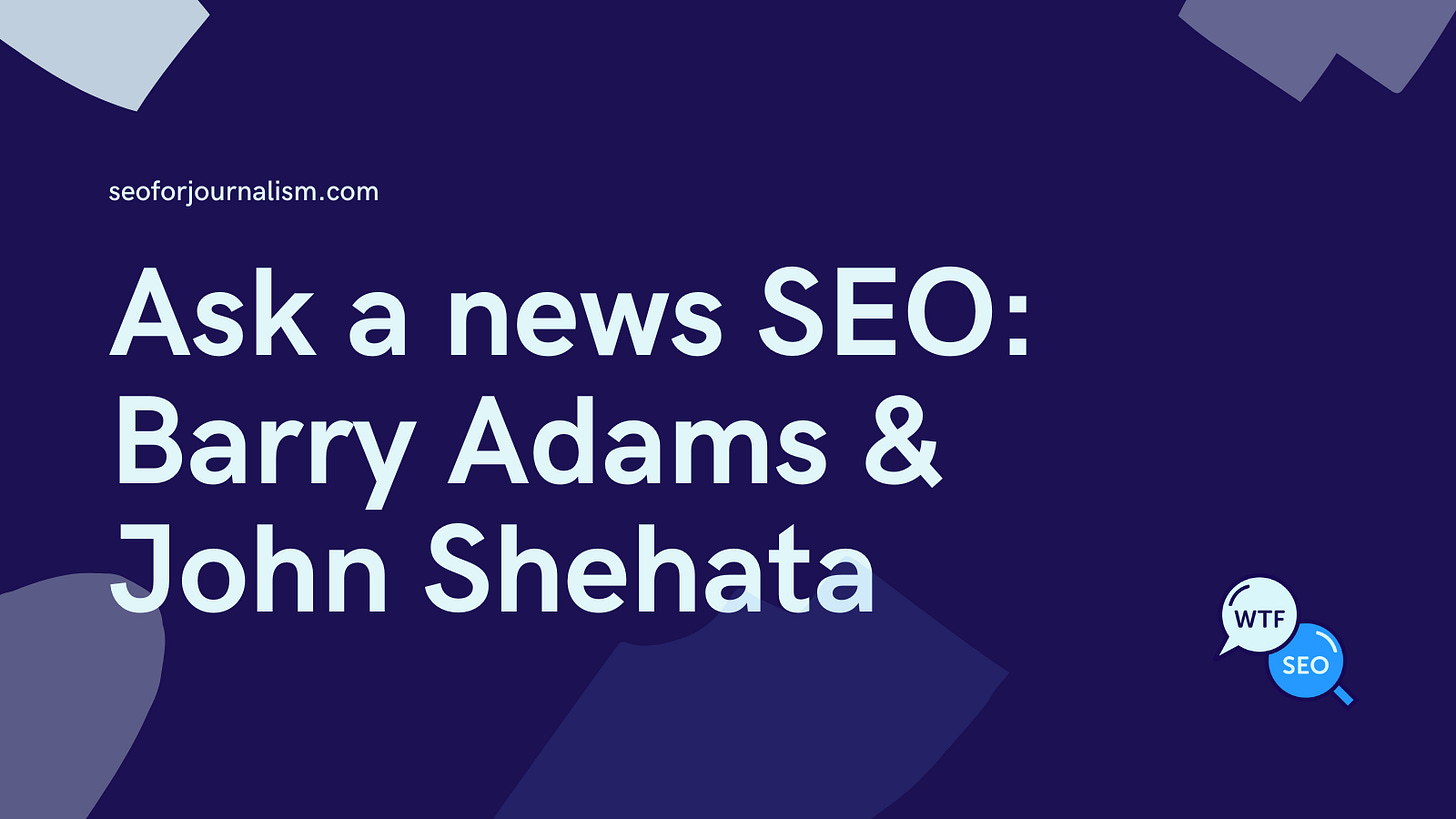🎟️ Giveaway! | Ask a News SEO with Barry Adams and John Shehata of NESS
In partnership with NESS, we're thrilled to be giving away 4 tickets to this year's News and Editorial SEO Summit! Find out how to enter the giveaway
Hello, and welcome back. It’s Jessie and Shelby, together for a special bonus edition of WTF is SEO?!
This week: We’re delighted to be joined by NESS co-founders Barry Adams and John Shehata for a special edition of Ask a News SEO. We chat about Google news and updates, the future of AI in search and the speakers they’re most excited about at the virtual conference coming up in October.
In partnership with the hosts, we're thrilled to be giving away 4 tickets to this year's News and Editorial SEO Summit! We want to extend our thanks to Barry and John for making this contest possible. Scroll to the end of this email for details about the giveaway!
Join our community of almost 1,400 news SEOs on Slack to chat any time.
WTF is SEO?: What’s the most in-demand skill for news SEOs working today?
John Shehata: News SEOs need to think more like business SEOs. More than just about traffic, they need to think of and understand the business. The more they can tailor their recommendations and strategic initiatives to the business, the more success they will have.
I think it's the bigger picture that sometimes a lot of news SEOs miss. They focus too much on small tactics, instead of the bigger strategies and business initiatives. That’s why sometimes we don't have a seat at the table.
Barry Adams: Being the translator between the SEO, technical and editorial worlds. I think those are massive skills. I still see too many newsrooms where SEOs work in isolation and aren't properly integrated into the product or editorial side of the business. The SEOs who are most successful are part of the wider picture. That relies very heavily on those SEOs being able to communicate effectively with product and editorial teams and understanding how those systems work so that they know where they fit in. They have to know how to fully integrate their own skill set to achieve business KPIs and drive forward the publisher's overall goals.
WTF is SEO?: Let’s talk predictions. What’s next for Google and how should SEOs prepare?
Barry: I don't think a lot is going to change. Everybody's scared to death about AI and large language models, but I think news is going to be almost entirely unaffected.
I think there'll be a massive backlash against LLMs (language learning models). Some, if not all, will be declared illegal in the next year due to massive amounts of copyright infringement.
Basically, what they've done is build a monetized product on someone else's output without asking permissions and without offering remuneration.
So I think there will be massive backlash. I think people were excited about the LLMs initially and that excitement has worn off. Now people are asking: What's it actually fucking useful for?
The answer is not an awful lot, actually. It's mediocre crap that it spits out — and people are starting to realize that.
The next generation that comes after is what's really interesting. Personalized AI systems, where you can train them on your own data; that becomes very interesting. It’s a portal for your readers to engage with and ask questions of your content. Now that I'm excited for, but we are still a ways away.
John: I have a few things.
First, early results of tracking SERPs, I thought that news was immune to the new SGE experience. But I think Google will test and show SGE on news queries within maybe four to eight hours. That doesn’t mean SGE will fully launch; Google might roll it a little bit back. But news is not immune to SGE, which will be very interesting.
Second, it will be very hard for new publishers or writers to rank if they don't have strong authority signals. The amount of content being produced with AI is like hundreds of thousands of stories a day, if not more. The internet will be flooded with AI, and poor quality content. That means Google has to go the extra mile to verify authorship and content quality. So to rank in this new era of AI Generated content, you have to show strong authority and E.E.A.T.
Third, SEOs have to learn a lot more about AI and ChatGPT. Not in the sense of “How will this replace my job?” But, “how will this make me more efficient at my job? How can I do SEO smarter?”
WTF is SEO?: Big publications with lots of content and the necessary tooling is one thing, but if you’re a niche or local outlet, you won’t have the same opportunities. What is Google going to do to make sure that there's a level playing field in search?
John: There's never been a level playing field.
Barry: And there never will be. It's inherently a zero sum game where the big players take most of the traffic and that is not going to change.
Google is trying to put emphasis on local, relevant signals to give local publishers more oomph on queries, especially if they have a local component. But it's very hit and miss because Google — like John said — has the authority signals they rely on. They have to use authority signals and quality signals to filter out the rubbish. They always had to do this.
But AI will accelerate this process and make it even more important.
Smaller publishers will continue to lose out and Google will continue to appeal to them by throwing crumbs off that table — like Google News Showcase or the Google News Initiative — or whatever else they can come up with.
It's not fair and it goes against our sense of justice. But it also means, for publishers, it’s not just about producing the content. It's also about making sure people know they're producing the content. I hate to use the word marketing in the context of news because it's sort of a dirty word in most of the publishing world, but they have to market themselves.
On local levels, they have to make sure they're building a local brand so people bypass search and go directly to their website. That’s the best way to immunize yourself against whatever the tech platforms are coming up with.
John: On the positive side, AI tools will be more accessible and cheaper. So smaller publishers will have access to a lot of these tools which big publishers already have
I like to focus on AI-guided content, instead of AI-written content.
AI can guide writers and newsrooms to write better content. Give them lots of information quickly, tell them what their competitors are doing so they can take advantage of that.
WTF is SEO?: Let’s talk about NESS, which is a month away. What do you think attendees should be most excited about for this year’s conference?
John: I'm excited about all the speakers.
When Barry and I were first discussing NESS, we said we want to create a conference that we want to attend. So this is how we have been putting together the programming for the conference every year.
We're putting together a conference for us as news SEOs to attend. This is a conference I would buy tickets for.
Kevin Indig is going to be amazing. Wil Reynolds is such an inspirational speaker. He will talk about the future of SEO and news SEO. Lily Ray is going to dig deeper into Google Discover. Richard Nazarewicz is going to talk more about product. Jes Scholz will talk a lot about technical aspects. Glenn Gabe is going to dive into Google algorithm and how news publishers can approach it.
And I’m going to talk about how you can do more with less.
Barry: I've spoken at a lot of conferences. I've gone to a lot of conferences. You sort of pick and choose which talks you want to go to (and there’s not a lot of them). But with NESS, every single session is like, “oh, I fucking got to see this. I have to see this.”
It’s what John said: We want to put on an event that we would like to attend ourselves. I'm still marveling at how fucking awesome it ends up being. I can't believe people actually say yes to this and deliver awesome content. It's absolutely fantastic.
I’m looking forward to Anna Sbuttoni and Claudio Cabrera who both will be talking about SEO in newsroom environments from their own perspectives, which is always a hot topic and open to many different approaches.
If I can highlight one specific speaker, Jes Scholz is the former CMO of Ringier (she’s now a freelance marketing consultant). People think I know technical SEO, but she is on a different level. I am in awe of her and I cannot wait to see her talk about crawl optimization for large websites. I’m probably going to watch that video back a hundred times.
Here's how to enter our NESS giveaway 🎉
Be a member of our Slack community.
NESS '23 will run October 10 and 11, 2023. All event details can be found on their website.
Contest ends September 26, 2023 at 11:59 p.m. ET. Winners will be announced on the SEO is Journalism Slack and contacted via email.
Get your company in front of over 7,600 writers, editors and digital marketers working in news and publishing. Sponsor the WTF is SEO? newsletter!
What did you think of this week's newsletter?
(Click to leave feedback.)
Catch up: Last week’s newsletter
Have something you’d like us to discuss? Send us a note on Twitter (Jessie or Shelby) or to our email: seoforjournalism@gmail.com.
Written by Jessie Willms and Shelby Blackley







How do you SEO Substack newsletters and comments. Possible?